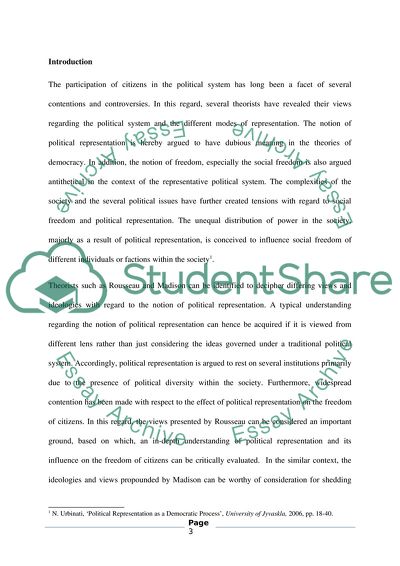Cite this document
(The Instant a People Gives Itself Representatives, It Ceases To Be Coursework Example | Topics and Well Written Essays - 3000 words, n.d.)
The Instant a People Gives Itself Representatives, It Ceases To Be Coursework Example | Topics and Well Written Essays - 3000 words. https://studentshare.org/social-science/1855413-the-instant-a-people-gives-itself-representatives-it-ceases-to-be-free-it-ceases-to-be-rousseau-discuss-with-reference-to-rousseau
The Instant a People Gives Itself Representatives, It Ceases To Be Coursework Example | Topics and Well Written Essays - 3000 words. https://studentshare.org/social-science/1855413-the-instant-a-people-gives-itself-representatives-it-ceases-to-be-free-it-ceases-to-be-rousseau-discuss-with-reference-to-rousseau
(The Instant a People Gives Itself Representatives, It Ceases To Be Coursework Example | Topics and Well Written Essays - 3000 Words)
The Instant a People Gives Itself Representatives, It Ceases To Be Coursework Example | Topics and Well Written Essays - 3000 Words. https://studentshare.org/social-science/1855413-the-instant-a-people-gives-itself-representatives-it-ceases-to-be-free-it-ceases-to-be-rousseau-discuss-with-reference-to-rousseau.
The Instant a People Gives Itself Representatives, It Ceases To Be Coursework Example | Topics and Well Written Essays - 3000 Words. https://studentshare.org/social-science/1855413-the-instant-a-people-gives-itself-representatives-it-ceases-to-be-free-it-ceases-to-be-rousseau-discuss-with-reference-to-rousseau.
“The Instant a People Gives Itself Representatives, It Ceases To Be Coursework Example | Topics and Well Written Essays - 3000 Words”. https://studentshare.org/social-science/1855413-the-instant-a-people-gives-itself-representatives-it-ceases-to-be-free-it-ceases-to-be-rousseau-discuss-with-reference-to-rousseau.


